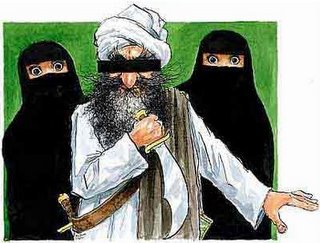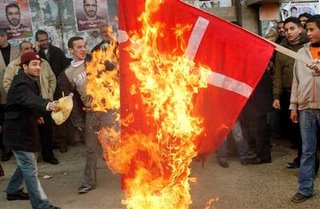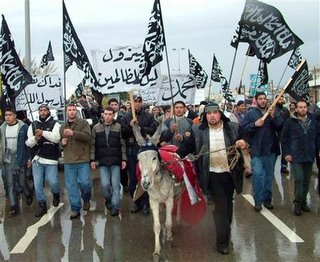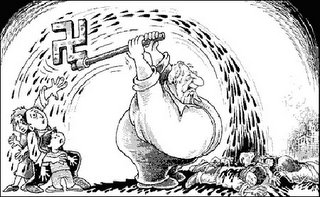 The story of the Danish cartoons of Mohammed, first published in the right-wing (by Danish standards) Jyllands-Posten last September has now reached the stage that even the British media has had to pay attention.
The story of the Danish cartoons of Mohammed, first published in the right-wing (by Danish standards) Jyllands-Posten last September has now reached the stage that even the British media has had to pay attention.Studiously avoiding the subject for months, while there were riots in Århus in the autumn, while ambassadors from Islamic countries demanded apologies, while representatives of Muslim groups in Denmark went whingeing to Muslim governments; it managed to demote the story even as more and more papers on the Continent published the cartoons and curious bits of rioting broke out in random parts of the Islamic world.
Even yesterday, as a Day of Anger was called for by, among others, Hizonner Ken Livingstone’s best friend Sheik Yussef al-Qaradawi (mentioned at last today by the Daily Telegraph), no British newspaper considered it necessary to put the story on its front page. (Well, how could it compare in importance with a golfer divorcing and Postman Pat calling on the Queen?)
Still, at least they started reporting the brouhaha and today some of them have put it on the front page. Needless to say, no British newspaper has dared to publish the cartoons.
 The BBC with oh so much harrumphing announced that they would broadcast them while explaining why they should be causing such strong feelings. This seemed a little pointless as by yesterday evening there were not many people around who could not work out what the issues were exactly (or, at least, some of them).
The BBC with oh so much harrumphing announced that they would broadcast them while explaining why they should be causing such strong feelings. This seemed a little pointless as by yesterday evening there were not many people around who could not work out what the issues were exactly (or, at least, some of them).In the event, 10 O’Clock News gave semi-darkened shots of the cartoons as they appeared in France Soir (whose editor had been sacked for publishing them) making it impossible for anyone to see what exactly the fuss was about.
 Stephen Pollard notes on his blog that the BBC Website carried a despatch by Michael Buchanan about Denmark and reactions to the fuss there, which ended with the following outrageous paragraph:
Stephen Pollard notes on his blog that the BBC Website carried a despatch by Michael Buchanan about Denmark and reactions to the fuss there, which ended with the following outrageous paragraph:Denmark's reputation as an easy-going, consensual nation has been severely tarnished in recent days. All the Danes can do now is hope the repeated apologies for the offence caused, by both the government and the newspaper, will end this unseemly row.It would appear that even the BBC or, perhaps, readers of its website have found this support for censorship hard to stomach and, while the despatch remains sniffy about Danes and about the right to publish cartoons, the quoted paragraph has been removed.
Nor have Britain's politicians exactly shown themselves in an attractive light. As Trade Commissar Peter Mandelson announced in response to the Saudi-inspired boycott of Danish goods that hit one, hit all in the EU.
Having done the one good deed of his political career, he managed to negate it by criticizing the cartoons as "crude and juvenile" and saying that reprinting them was like "throwing petrol on the flame of the original issue". That rather depends, Commissioner, as to what the original issue was.
Meanwhile Jack Straw, the Foreign Secretary, has also joined in the fray, announcing that he was extremely annoyed by the decision of an ever larger number of newspapers to reprint the cartoons.
“There is freedom of speech, we all respect that, but there is not any obligation to insult or to be gratuitously inflammatory. I believe that the republication of these cartoons has been unnecessary, it has been insensitive, it has been disrespectful and it has been wrong.”Well, he need not worry about the British media. They will do nothing disrespectful. Well, nothing disrespectful to those who are threatening them with all sorts of nasty punishments, even though the chances of those punishments being put into effect are minimal.
You cannot bribe or twist,
Thank God, the British journalist.
But seeing what he unbribed will do,
You have no occasion to.
Just remember, next time you hear comments from British journalists about the wonders of the British media and their own belief in freedom (within bounds, naturellement), you can always ask them this simple question: And what did you do in the War of the Danish Cartoons?
The Finnish Foreign Minister, Erkki Tuomioja took a somewhat different line:
It's evident that all EU countries must together condemn and act against all violence and threats of violence as well as threats of interfering with trade relationships connected with this affair.Other EU politicians have been reluctantly drawn into the fray by the simple and utterly predictable fact that as violence spread in the Gaza, it turned against the EU, whose office was closed down and whose officials had to escape.
Vice-President Franco Frattini issued a statement, in which he explained that he did not think that those cartoons were a great idea and did nothing for world peace but, nevertheless, he did not think that newspapers or countries should be threatened in any way when exercising their right to freedom of speech.
It is my duty to enter this debate to remind us all that there are delicate issues, particularly in relation to religion and those ideals that are sacred to us. Consequently, I personally regard the publication of the cartoons as somewhat imprudent, even if the satire used was aimed at a distorted interpretation of religion, such as that used by terrorists to recruit young people to their cause and turning them into fanatics, sometimes to the point of sending them into action as suicide bombers.Let's face it, this is preferable to what our own politicians have been spouting or what Justin Higgins, a spokesman for the State Department said:
These cartoons are indeed offensive to the beliefs of Muslims.Quite so. Of course, it is questionable who is inciting religious or ethnic hatred, people who publish cartoons or those who burn flags, storm offices and embassies and carry the sort of placards that Michelle Malkin, among others posts on her blog.
We all fully recognize and respect freedom of the press and expression but it must be coupled with press responsibility.Inciting religious or ethnic hatreds in this manner is not acceptable. We call for tolerance and respect for all communities and for their religious beliefs and practices.
Michelle, incidentally, also points out that the State Department does not speak for America or Americans. Well, neither do the Foreign Office or the BBC speak for Britain or the British people.
Glenn Reynolds on Instapundit says this is a dreadful mistake on the part of the State Department but it might be payback time for lack of European support. Maybe.
In the meantime, the cartoons appeared all over the blogosphere and ever more newspapers, some briefly even in the Middle East have reprinted them. In America the New York Sun did and the Los Angeles Times, apparently, intends to.
The question is surely, why has the story turned to furore now. As my colleague has pointed out, the reprinting of the cartoons is more in the nature of refusing to be bullied than a stand for freedom of speech. I actually think it is a bit of both as editors of newspapers suddenly realized that special deals are not conducive to their own ability to publish what they see fit.
One blogger has pointed out that the cartoons did have an indirect effect on British politics by possibly swinging that famous vote over the Religious Hatred Bill (still a threat to free speech, as Pub Philosopher insists):
Home Office minister, Paul Goggins, was forced to admit that anyone publishing the cartoons in the UK would be liable to prosecution under the new law. So, insulting, abusive or reckless criticism of religion is OK but threatening language is not.Think of that. This is the only country in Europe, possibly in the West that is heading towards a state of play when a newspaper can be prosecuted for publishing cartoons. The country of John Milton and John Locke among others. Have these people no shame?
Let us just recall the sequence of events in the last couple of weeks. The story had rumbled on for months with both the editor and the Danish Prime Minister steadily refusing to apologize, though making noises about not liking to upset people.
Then a couple of weeks ago a Norwegian newspaper reprinted the cartoons and there the government did apologize.
The next thing we knew was a Saudi inspired boycott of Danish goods, which in turn led to the "Support Danish goods" campaign that spread like wildfire around the internet. Of all the Danes involved in this saga, the least impressive was the Director of Arla Foods who called on the government to apologize as the cartoons clearly insulted millions of Muslims and that really hurt him. Why not just say he was worried about his company's profits? Honesty is always the best policy at times like this.
Arla also announced fantastic losses in the Middle East but neither that nor the possibility of profit warnings announced a few days before prevented them from buying the American company White Clover.
 And suddenly there were riots. As one Egyptian blogger asked who was promoting them? In Gaza they not only stormed EU offices but burned Danish and Norwegian flags. (Now, I suppose, they have to burn French, German, Spanish and various other flags, though not the Union Flag.)
And suddenly there were riots. As one Egyptian blogger asked who was promoting them? In Gaza they not only stormed EU offices but burned Danish and Norwegian flags. (Now, I suppose, they have to burn French, German, Spanish and various other flags, though not the Union Flag.)Can you walk into a store in Gaza and say "I'll have three pounds of rice, a large tub of hummus, five pounds of olives and a couple of Danish flags to burn"? Then again, many of the flags seem to be home-made, which must be a help to the women's sewing circle but where did the extra sheets, paint and patterns come from?
 The Gaza riots seem to have been promoted by sub-groups of Fatah (our old friends the Al-Aqsa Martyrs' Brigade appear to have played an important part). There may be a certain amount of one-upmanship here as they may have been chagrined at being seen as moderate.
The Gaza riots seem to have been promoted by sub-groups of Fatah (our old friends the Al-Aqsa Martyrs' Brigade appear to have played an important part). There may be a certain amount of one-upmanship here as they may have been chagrined at being seen as moderate.Then again, if I were a Hamas politician faced with the need to start clearing up rubbish and running various other projects while the budget goes into free-fall, I, too, might think that a bit of rioting and flag-burning is just the thing to take the people’s minds off their real problems.
Could the same kind of thinking apply to many of the organizers in other Muslim countries? Increase the number of external enemies and nobody will notice that most Muslims’ worst enemies are their own governments.
For it is not precisely true that the insult is unbearable. In the first place, though Islamic art supposedly forbids the depiction of human beings, nobody outside the Arab culture (and often not within it) has lived up to it. What of the exquisite Persian miniatures, Ottoman paintings or Mughal illustrations?
Nor has Mohammed never been depicted before (he was only a man, after all), though maybe not quite in the way the cartoons did. But then, as several Middle Eastern and other Islamic commentators have noted, by rioting, burning and screaming abuse, Muslims seem to have proved the essential truth of those cartoons.
 Finally, before we get too excited about hurt feelings, we might look at some of the recent Arab cartoons, collected by Tom Gross. Many of them would have been published with great glee in Der Stürmer. Others are slightly more modern. What of this depiction of Auschwitz with Israeli flags replacing the Nazi ones? I can think of a couple of western publications that would cheerfully republish them without worrying too much about hurting anybody’s feelings.
Finally, before we get too excited about hurt feelings, we might look at some of the recent Arab cartoons, collected by Tom Gross. Many of them would have been published with great glee in Der Stürmer. Others are slightly more modern. What of this depiction of Auschwitz with Israeli flags replacing the Nazi ones? I can think of a couple of western publications that would cheerfully republish them without worrying too much about hurting anybody’s feelings.Stephen Pollard reproduces a rather nasty and, let's face it, inaccurate cartoon on his blog. And so it goes.
On the plus side, there have been some calls from Islamic leaders to stop the attacks. Not too many and they are all tempered with explanations about Muslim sensitivity. And some journalists and bloggers (like The Big Pharaoh I mentioned above) have been pleading with Muslims to "grow up" and stop pretending that a set of cartoons can in some mysterious way undermine their religion.
But it seems that more and more western politicians and journalists are digging their heels in. What started as a minor row in a small country that has a remarkable record of standing up to totalitarian bullies, has developed into a real fight over basic cultural tenets.
COMMENT THREAD
No comments:
Post a Comment
Note: only a member of this blog may post a comment.